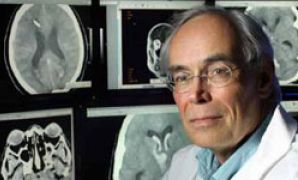ABOUT BIOS CTCC

Led by Daniel F. Hanley, MD, the BIOS Clinical Trials Coordinating Center is an academic research organization (ARO; clinical trial data management center, imaging reading center, and enrollment center) within the Johns Hopkins School of Medicine. Its focus is to provide multicenter coordinating infrastructure to a variety of clinical trials evaluating therapeutic, preventive, and diagnostic interventions. Home to the NCATS-sponsored Johns Hopkins University Trial Innovation Center (JHU TIC), BIOS CTCC is disease-agnostic with unique expertise in the coordination and management of trials investigating rare diseases and disorders, acute neurologic ICU conditions, rehabilitation, pain management, and functional outcomes. Dr. Hanley, the director of BIOS CTCC and PI of the TIC, has been continuously funded by the NIH since 1984.
Although BIOS CTCC originated in the JHU Department of Neurology as the Brain Injury Outcomes Division, it has expanded beyond support for neurology trials. Since the 1990s, BIOS CTCC has coordinated international, federally funded, and industry-sponsored trials across a range of conditions for investigators at Johns Hopkins University and other medical centers. Dr. Hanley and his team of investigators have an outstanding record of clinical trials coordination, data management, clinical and safety event adjudication, and statistical analysis. BIOS CTCC has developed technical and organizational trial innovations including processes integral to web-based electronic data collection systems, trial performance metrics and summaries, trial management techniques resulting in site and subject retention, websites for investigators and the scientific community, an online training facility for skill certification, and electronic regulatory depositories.
- Clinical Coordinating Center (CCC)
- Centralized CT Reading Center
- Surgical Support Center
- Investigator Selection & Qualification
- Clinical Site Management
- Safety & Pharmacovigilance
- On-site and Remote QA Monitoring
- Regulatory (IND, IDE, GCP)
- Data Coordinating Center (DCC)
- Clinical Data Management
- Advanced Biostatistics
- Adaptive Randomization
- Electronic Data Capture (EDC)
- Electronic Trial Master File (eTMF)
- Clinical Trial Management System (CTMS)
- Online Training & Certification
- Hemorrhagic Stroke (ICH, IVH) & Ischemic Stroke (TIA)
- Neurosurgery
- Convalescent plasma for COVID-19
- Cardiac disorders and devices
- Pediatric pulmonary atrial hypertension
- Alzheimer’s disease and dementia
- Multiple sclerosis
- Obstructive sleep apnea
In multiple clinical areas, BIOS CTCC has developed novel standardized clinical protocols and clinical assessment tools, using investigator consensus methods. BIOS CTCC pioneered the use of surrogate measures from brain images to assess disease state and severity in different types of brain injury. Additionally, tools from “first of a kind” BIOS CTCC trials have been adopted in subsequent trials by others. BIOS CTCC offers quality-controlled collection and validation routines for detailed neurological data and has extensive experience designing precise, unambiguous point-of-care tools designed to report and analyze:
- Injury, recovery and outcomes
- Surgical and ICU protocols and performance
- Medical event tracking
- Timeline analyses comparing physiologic measurements to dosing and adverse events, and performance within timeframes
BIONIC Image Lab and Reading Center
 The Brain Injury Outcomes NeuroImaging Center (BIONIC) CT/MRI core image lab and reading center has developed innovative, accurate methods for the qualitative and quantitative volumetric analysis of brain lesions, as well as general image acquisition, harmonization, processing, and management protocols across a spectrum of imaging modalities. It has successfully combined image and data management systems to produce meaningfully designed reports of outcomes, surgical performance, drug delivery, infection tracking, new events, and adverse event (AE) tracking across multiple clinical trials targeting a range of therapeutic areas.
The Brain Injury Outcomes NeuroImaging Center (BIONIC) CT/MRI core image lab and reading center has developed innovative, accurate methods for the qualitative and quantitative volumetric analysis of brain lesions, as well as general image acquisition, harmonization, processing, and management protocols across a spectrum of imaging modalities. It has successfully combined image and data management systems to produce meaningfully designed reports of outcomes, surgical performance, drug delivery, infection tracking, new events, and adverse event (AE) tracking across multiple clinical trials targeting a range of therapeutic areas.
ICTR
The Johns Hopkins Institute for Clinical and Translational Research (ICTR), established in 2007, is one of more than 60 medical research institutions working together as a national consortium to improve the way biomedical research is conducted across the country. The ICTR addresses obstacles in translating basic science discoveries into research in humans, translating clinical discoveries into the community and communicating experience from clinical practice back to researchers.
In 2017, BIOS CTCC and ICTR, together with investigators from Tufts University, won a seven-year award from the NIH National Center for Advancing Translational Sciences (NCATS) to form one of three national Trial Innovation Centers (TICs) to provide high-quality design and operational support to investigators conducting multicenter clinical trials as part of the Trial Innovation Network. Today, BIOS CTCC and ICTR continue these efforts as the Johns Hopkins University TIC.
History
BIOS CTCC has managed trials testing drugs and devices to treat stroke (both ischemic and hemorrhagic), brain infections, muscular dystrophy, sickle cell disease, infectious disease, cardiovascular disease, cardiac arrest, neuromuscular disorders, and brain trauma within Johns Hopkins University, around the nation, and worldwide.
Previous trials with international coordination responsibilities include the NINDS-funded MISTIE trials for intracerebral hemorrhage, the NINDS- and FDA-funded CLEAR trials for intraventricular hemorrhage, and the NINDS-funded ATACH for acute cerebral hemorrhage.
Funding
BIOS CTCC maintains a high level of research activity and has received substantial funding from the following:
- National Center for Advancing Translational Sciences (NCATS)
- National Heart, Lung, and Blood Institute (NHLBI)
- National Institute of Neurological Disorders and Stroke (NINDS)
- National Institute of Allergy and Infectious Diseases (NIAID)
- Department of Defense
- Department of Veterans Affairs
- Small Business Innovation Research (SBIR)
- FDA Office of Orphan Products Development (rare diseases)
- American Academy of Neurology
- American Heart Association
- Doris Duke Foundation
- Genentech and several pharmaceutical organizations
- EKOS Corporation and other device companies
